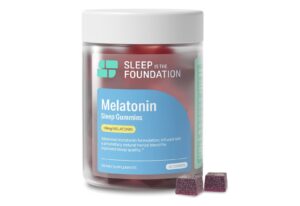Can Melatonin Cause Nightmares?
- Melatonin is a hormone that can be taken as a supplement to induce sleep.
- Some individuals may experience vivid dreams or nightmares with melatonin use, but it’s not common.
- Melatonin is generally safe for short-term use but more research is needed.
- If considering melatonin for sleep, speak to a doctor about starting with the lowest recommended dose.
Many people do not get enough sleep or get poor-quality sleep. As a result, they may look to over-the-counter products to help them sleep better. One particular sleep aid whose use is on the rise is the supplement melatonin. Melatonin is a naturally occurring hormone, present in the human body. It is also made synthetically and is available over the counter in the form of pills, liquids, patches, and gummies.
Supplemental melatonin is generally safe. However, some people report having nightmares after taking supplemental melatonin, in addition to other side effects that can occur.
Is Melatonin a Cause of Nightmares or Vivid Dreams?
Some people report having nightmares after taking melatonin supplements . It is uncertain, however, whether the melatonin itself actually causes those nightmares, or if other factors contribute as well.
Nightmares usually occur during the rapid eye movement (REM) stage of sleep, when the brain is active in ways resembling wakefulness. Most dreaming occurs later in the night’s sleep, which includes more time spent in REM sleep.
Nightmares are more likely to occur during stressful times in life. They are generally attributed to traumatic events and other stressors. Medications can also trigger nightmares, as can some mental health conditions. But more research is needed to determine the underlying causes of nightmares .
Get to the root of your sleep problems
Melatonin can help, but it’s best to find the source of your sleep issues. Answer these questions to better understand your sleep.
How Does Melatonin Work?
Naturally occurring melatonin is important in the sleep-wake cycle, helping people to feel sleepy at night and less so during the day. The brain produces melatonin in response to darkness and suppresses its production in response to light.
Some people with low melatonin levels may have difficulty sleeping . In such cases, supplementing natural melatonin with synthetic melatonin may be helpful. Supplemental melatonin may also be helpful for people with delayed sleep-wake phase syndrome, jet lag, and insomnia.
Is Melatonin Safe?
Melatonin is probably safe for short-term use among adults, and it is possibly safe for regular use up to two years. However, more research will be needed to get a fuller picture of melatonin’s safety and side effects.
The Food and Drug Administration (FDA) classifies synthetic melatonin as a dietary supplement and does not regulate it as rigorously as medications. As a consequence, a given product’s packaging may not match its true ingredients or the amount of a particular ingredient.
People considering taking a melatonin supplement may wish to look for the United States Pharmacopeia (USP) approval label on the product’s packaging, as this organization’s process verifies the ingredients and their quality. They should also discuss this decision with their doctors first, to determine whether it would be appropriate and safe.
There is an absence of research about the overall safety of melatonin for children and adolescents, and its short- and long-term effects in younger people. Because it is a hormone, there is some concern that its use could possibly affect hormone development. Parents and caregivers should always consult with a doctor before administering melatonin to children. Often, changes to sleep hygiene are recommended as a starting place for adolescent sleep issues.

Why Might Melatonin Cause Nightmares or Vivid Dreams
Research shows that supplemental melatonin can increase a person’s sleep time overall. In addition, melatonin can increase the length of time that people spend in REM sleep , the stage in which most dreams occur. By increasing the amount of time spent in the stage of sleep when most dreaming happens, melatonin may allow more time for people to experience nightmares.
However, other circumstances or conditions might also explain the nightmares experienced by people who take supplemental melatonin. For instance, psychological distress may lead to insomnia, which some people may treat with melatonin. But psychological stress can also lead to more frequent nightmares. Thus, it may be difficult to say whether the stress or the melatonin is responsible for the nightmares.
What Are Other Side Effects of Melatonin?
In addition to vivid dreams or nightmares, some adults and children report dizziness, headaches, and even agitation as the most common side effects of short-term melatonin use. Long-term side effects are not well documented.
More serious side effects may also be possible, which people may want to consider before taking melatonin.
- Medication interactions: Supplemental melatonin can interact with several different drugs and prescription medications. This interaction can alter the effect that melatonin has on the body or increase its side effects. Such medications include caffeine, some birth control pills, and some medications used to treat diabetes.
- Increased immune activity: Supplemental melatonin can boost some functions of the immune system. People who take immunosuppressive medications, such as transplant recipients, may be advised to avoid taking melatonin.
- High blood pressure risk: Supplemental melatonin can increase some people’s blood pressure. People taking medication for hypertension may want to avoid using this supplement.
When to See a Health Professional
If you are experiencing frequent nightmares that interfere with your sleep or functioning during the day, you may wish to consult a doctor. A health care provider may be able to help you determine the underlying cause of your nightmares, as well as provide treatment options and coping strategies.
Talking with a health care professional is generally a good idea when experiencing difficulty sleeping, especially if you are considering taking supplements or other natural therapies. Your health care provider can help you understand the specific sleep-related difficulties you’re facing and can help you decide if melatonin is right for you.
Keep in mind that supplemental melatonin may interact with other medications, can worsen some conditions, and has not been safely studied in those who are pregnant or who are breastfeeding. Therefore, it is best to talk with a health care provider before taking a melatonin supplement.

Still have questions? Ask our community!
Join our Sleep Care Community — a trusted hub of sleep health professionals, product specialists, and people just like you. Whether you need expert sleep advice for your insomnia or you’re searching for the perfect mattress, we’ve got you covered. Get personalized guidance from the experts who know sleep best.
Medical Disclaimer: The content on this page should not be taken as medical advice or used as a recommendation for any specific treatment or medication. Always consult your doctor before taking a new medication or changing your current treatment.
References
6 Sources
-
Neubauer, D. N. (2022, December 19). Pharmacotherapy for insomnia in adults. In Benca, R., & Elmore, J. G. (Eds.). UpToDate., Retrieved January 10, 2023, from
https://www.uptodate.com/contents/pharmacotherapy-for-insomnia-in-adults -
Levin, R., & Nielsen, T. A. (2007). Disturbed dreaming, posttraumatic stress disorder, and affect distress: A review and neurocognitive model. Psychological Bulletin, 133(3), 482–528.
https://pubmed.ncbi.nlm.nih.gov/17469988/ -
Hardeland R. (2012). Neurobiology, pathophysiology, and treatment of melatonin deficiency and dysfunction. The Scientific World Journal, 2012, 640389.
https://pubmed.ncbi.nlm.nih.gov/22629173/ -
Li, J., Somers, V. K., Xu, H., Lopez-Jimenez, F., & Covassin, N. (2022). Trends in use of melatonin supplements among US adults, 1999–2018. JAMA, 327(5), 483–485.
https://pubmed.ncbi.nlm.nih.gov/35103775 -
Kunz, D., Mahlberg, R., Müller, C., Tilmann, A., & Bes, F. (2004). Melatonin in patients with reduced REM sleep duration: Two randomized controlled trials. The Journal of Clinical Endocrinology and Metabolism, 89(1), 128–134.
https://pubmed.ncbi.nlm.nih.gov/14715839/ -
Srinivasan, V., Maestroni, G. J., Cardinali, D. P., Esquifino, A. I., Perumal, S. R., & Miller, S. C. (2005). Melatonin, immune function and aging. Immunity and Ageing, 2, 17.
https://pubmed.ncbi.nlm.nih.gov/16316470/

















